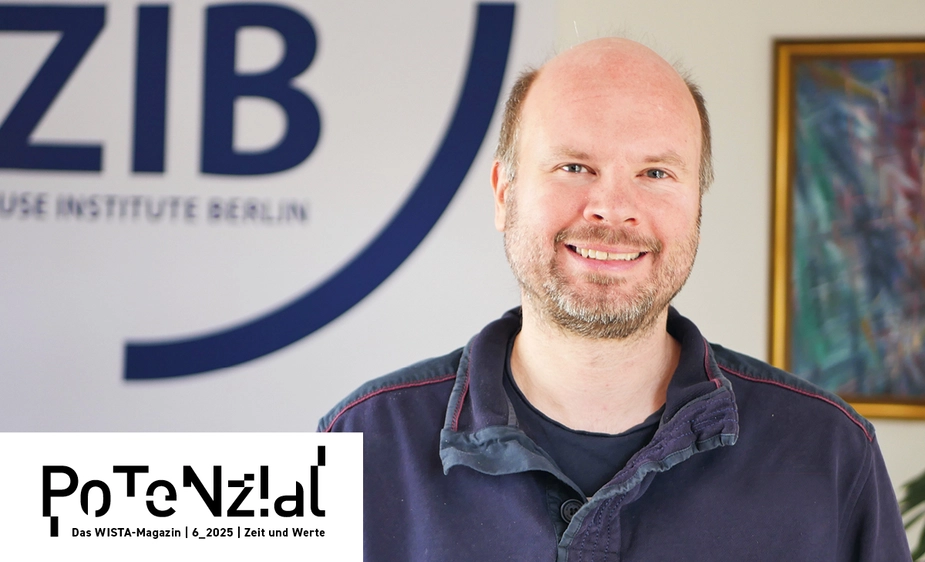Algorithms for health
Tim Conrad from the Zuse Institute Berlin improves the visibility of application-oriented mathematics
Tim Conrad develops mathematical methods for analysing medical data at Zuse Institute Berlin, as part of the Research Campus MODAL. His team recently moved into FUHUB—and is improving the visibility of application-oriented mathematics.
When a patient takes a blood test, they receive 20 to 30 parameters, including the number and composition of blood cells. Extended blood tests add further values, such as blood sugar, cholesterol, or liver function markers. Modern analytical methods can extract millions of data points from the same drop of blood—on genes, proteins, metabolites, or even the composition of the gut microbiome. The insights this provides into health and disease are enormous. But who can process it all? “Many of these interrelationships are barely researched,” says Tim Conrad, who leads the department Visual and Data-Centric Computing at Zuse Institute Berlin (ZIB). “Our task is to identify structures and patterns in these data—so that doctors can make concrete, informed decisions.”
Conrad is a bioinformatician with a doctorate in mathematics. He is also a bridge-builder between theory and application. Together with his team, he develops algorithms capable of mining vast amounts of biomedical data— gene analyses, medical images, long-term ECG recordings. The goal is to facilitate personalised medicine. This is an umbrella term for therapies tailored precisely to an individual’s condition. “Imagine having hundreds of phone books full of information,” says Conrad. “Our methods help find the pages that contain the crucial clues to a possible illness.”
Time is often the scarcest resource in medicine. This is where the methods used by Conrad and his team come in. In collaboration with partners in medical technology, his team has taken ECG data analysis to a new level. At the heart of the project is a system for long-term heart monitoring. It involves a sensor implanted under the skin, which is developed and distributed by an industrial partner. The sensor records simplified ECGs—the heart’s electrical activity. “These data are extremely valuable, but large-scale analysis is labour-intensive and requires specialised staff,” explains the bioinformatician. To ease the burden on them, the team developed an analysis method that automatically identifies and filters out non-critical curves with high accuracy. “The new solution reduces false alarms and gives medical staff space to focus on the data that really matters.”
This works because classical mathematical methods and modern AI approaches work hand in hand. Conrad describes the interaction as team play with clearly defined roles: “AI can help reach good solutions faster,” he says. “But in medicine, we need safety. We want transparent, traceable methods, not a black-box AI. In the end, someone must take responsibility for a method or therapy. That’s done by a human being.”
Since this summer, Tim Conrad and his team have been renting offices at the life sciences centre FUHUB, which is part of the Research Campus MODAL as well as the Zukunftsort Berlin Southwest, Zukunftsort being German for future place, meaning a site generating future innovation. The Research Campus MODAL is a partnership project between Zuse Institute Berlin (ZIB), Freie Universität Berlin (FU), and more than 30 industry partners, researching and developing digital systems to optimise data-driven processes in energy, healthcare, mobility, and communications. Conrad heads the MedLab, dedicated to medical data analysis.
What makes MODAL special is that researchers and industry partners work side by side. Research ideas are not born in the ivory tower but in direct exchange with real-world problems. “We don’t build products,” he says. “But with our methods, we can develop demonstrators that show how mathematics helps solve real questions.”
For Berlin, MODAL is a flagship project. “We are a kind of contact point for applied mathematics in the region,” he says. “If someone comes to us with a data-driven idea, we can think along, do research, and make connections.”The topics may be complex, but the benefits are tangible. Especially when algorithms help people stay healthy.
Kai Dürfeld for Potenzial

